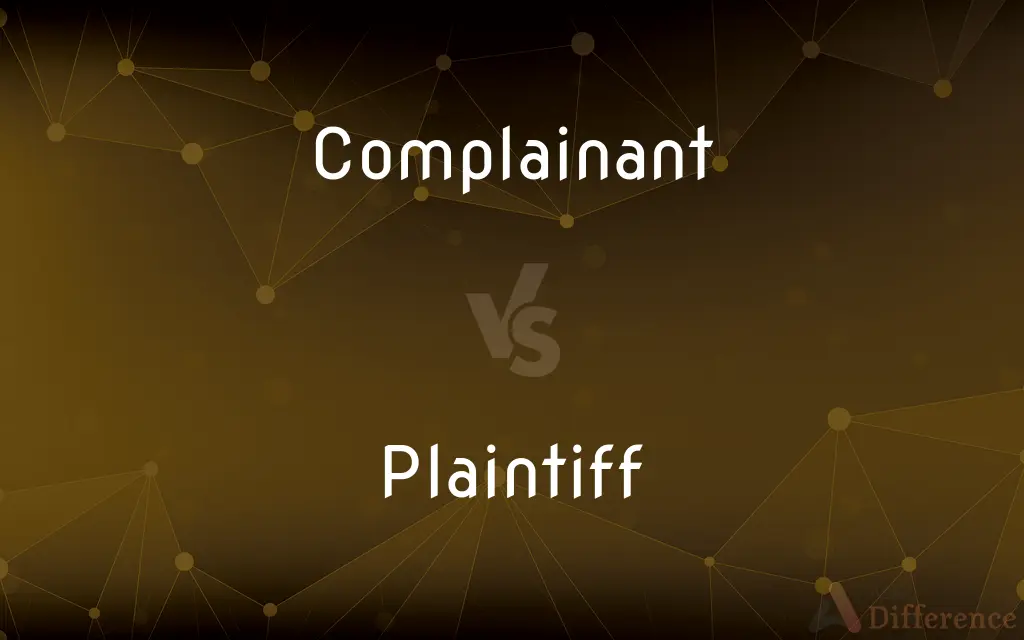Complainant vs. Plaintiff — What's the Difference?
Edited by Tayyaba Rehman — By Urooj Arif — Updated on March 11, 2024
Complainant refers to someone who makes a formal accusation or complaint, while plaintiff is a person who brings a lawsuit in civil court.

Difference Between Complainant and Plaintiff
Table of Contents
ADVERTISEMENT
Key Differences
The term complainant is used broadly to describe an individual or party that lodges a formal complaint or accusation, often within various legal and administrative contexts. The plaintiff, however, specifically refers to an individual or entity that initiates a lawsuit in civil court, seeking legal remedy from another party, known as the defendant.
Complainants can be found in criminal, civil, and administrative proceedings, highlighting their role in initiating actions based on grievances. In contrast, plaintiffs are exclusively part of civil litigation, indicating a narrower scope of application focused on disputes between private parties over rights and obligations.
The role of the complainant emphasizes the act of making an accusation or complaint, which could lead to investigations or disciplinary actions, not necessarily involving a court case. On the other hand, the plaintiff's role is inherently tied to the judicial process, seeking judgments or settlements within the legal framework.
While complainants initiate a process that may or may not involve seeking monetary damages or specific remedies, plaintiffs explicitly seek legal redress, which may include compensation, injunctions, or declaratory judgments. This difference underscores the complainant's broader application versus the plaintiff's specific legal intent.
Understanding the distinction between complainant and plaintiff is crucial for navigating legal systems, highlighting the specific contexts and outcomes associated with each term. Complainants bring forth accusations that might lead to various resolutions, while plaintiffs engage in civil litigation aiming for judicially enforced resolutions.
ADVERTISEMENT
Comparison Chart
Definition
Someone who makes a formal accusation or complaint.
A person who brings a lawsuit in civil court.
Context
Can be involved in criminal, civil, or administrative proceedings.
Exclusive to civil litigation.
Role
Initiates a complaint or accusation.
Initiates a lawsuit seeking legal remedy.
Objective
May seek investigation, disciplinary action, or resolution.
Seeks judicial judgment or settlement.
Legal Redress
Not necessarily seeking monetary damages or legal remedy.
Explicitly seeks compensation, injunctions, or other legal remedies.
Compare with Definitions
Complainant
An individual or entity lodging a formal complaint or accusation.
The complainant filed a grievance against the company's unfair practices.
Plaintiff
An individual or party initiating a civil lawsuit for legal remedy.
The plaintiff sued the contractor for breach of contract.
Complainant
Plays a crucial role in bringing issues to light within various contexts.
Complainants in harassment cases help enforce workplace policies.
Plaintiff
Central to the civil litigation process, advocating for their rights.
The plaintiff's case set a precedent for future legal interpretations.
Complainant
May be involved in procedures across legal and administrative spectrums.
The environmental agency acted upon complaints from local complainants.
Plaintiff
Seeks to resolve disputes over rights and obligations through court.
The plaintiffs in the class action sought compensation for damages.
Complainant
Their action may not always lead to judicial proceedings.
Many complainants seek resolution through mediation or arbitration.
Plaintiff
Directly engages with the defendant in a court setting.
The plaintiff and defendant presented their arguments during the trial.
Complainant
Initiates a process that could lead to investigation or disciplinary action.
The complainant's report prompted an internal review of the department's conduct.
Plaintiff
Engages in legal battles often involving complex judicial procedures.
The plaintiff's legal team meticulously prepared their case for trial.
Complainant
A plaintiff in certain lawsuits.
Plaintiff
A plaintiff (Π in legal shorthand) is the party who initiates a lawsuit (also known as an action) before a court. By doing so, the plaintiff seeks a legal remedy.
Complainant
A plaintiff.
Plaintiff
A person who brings a case against another in a court of law
The plaintiff commenced an action for damages
Complainant
A prosecuting witness in a criminal case.
Plaintiff
The party that institutes a suit in a court.
Complainant
A person who files a formal accusation or brings a formal charge.
Plaintiff
A party bringing a suit in civil law against a defendant; accuser.
Complainant
(legal) The party that brings a civil lawsuit against another; the plaintiff.
Plaintiff
One who commences a personal action or suit to obtain a remedy for an injury to his rights; - opposed to defendant.
Complainant
(legal) An alleged victim in a criminal investigation or trial.
Plaintiff
See Plaintive.
Complainant
One who makes complaint.
Plaintiff
A person who brings an action in a court of law
Complainant
One who makes complaint.
Eager complainants of the dispute.
Complainant
One who commences a legal process by a complaint.
He shall forfeit one moiety to the use of the town, and the other moiety to the use of the complainant.
Complainant
A person who brings an action in a court of law
Common Curiosities
Can a complainant become a plaintiff?
Yes, if a complainant's issue leads to a lawsuit in civil court, they can become a plaintiff.
Who can be a complainant?
Anyone who lodges a formal complaint or accusation, regardless of the context, can be a complainant.
Is the role of a complainant limited to legal proceedings?
No, complainants can also be involved in administrative or internal proceedings, not just legal ones.
How is the defendant involved in cases with complainants and plaintiffs?
In cases with complainants, the defendant may face accusations or disciplinary actions. In cases with plaintiffs, the defendant responds to the lawsuit in civil court.
What is the significance of the complainant in criminal cases?
The complainant initiates the case by reporting a crime, leading to criminal investigations and possibly charges.
What happens if a plaintiff wins their case?
If a plaintiff wins, the court orders the defendant to fulfill the remedy sought, such as paying damages or ceasing a harmful activity.
What does a plaintiff seek in court?
Plaintiffs seek legal remedies such as compensation, injunctions, or the enforcement of rights.
Can organizations be plaintiffs?
Yes, organizations, as well as individuals, can be plaintiffs in civil litigation.
What types of cases involve a plaintiff?
Civil cases, including disputes over contracts, torts (injuries), property, and family law, involve plaintiffs.
What distinguishes a complaint from a lawsuit?
A complaint can be a general grievance or accusation, while a lawsuit specifically seeks a legal remedy in court.
Do complainants always seek financial compensation?
Not necessarily; complainants may seek various outcomes, including corrective actions, apologies, or policy changes.
How do plaintiffs prove their case?
Plaintiffs must provide evidence and arguments to support their claims and convince the court of their entitlement to the legal remedy sought.
Can a complainant or plaintiff withdraw their action?
Yes, both complainants and plaintiffs can withdraw their actions, though the process and implications differ depending on the context.
Why is it important to understand the difference between complainant and plaintiff?
Understanding the difference helps navigate legal and administrative processes, knowing the rights, expectations, and potential outcomes associated with each role.
Share Your Discovery

Previous Comparison
Loyer vs. Lawyer
Next Comparison
Binturong vs. CivetAuthor Spotlight
Written by
Urooj ArifUrooj is a skilled content writer at Ask Difference, known for her exceptional ability to simplify complex topics into engaging and informative content. With a passion for research and a flair for clear, concise writing, she consistently delivers articles that resonate with our diverse audience.
Edited by
Tayyaba RehmanTayyaba Rehman is a distinguished writer, currently serving as a primary contributor to askdifference.com. As a researcher in semantics and etymology, Tayyaba's passion for the complexity of languages and their distinctions has found a perfect home on the platform. Tayyaba delves into the intricacies of language, distinguishing between commonly confused words and phrases, thereby providing clarity for readers worldwide.














































